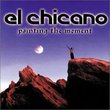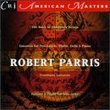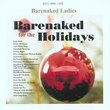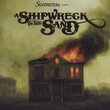| All Artists: John Coltrane Title: COLTRANE The Classic Quartet: Complete Impulse! Studio Recordings Members Wishing: 3 Total Copies: 0 Label: Grp Records Original Release Date: 11/17/1998 Release Date: 11/17/1998 Album Type: Box set Genres: Jazz, Pop Styles: Avant Garde & Free Jazz, Modern Postbebop, Bebop Number of Discs: 8 SwapaCD Credits: 8 UPC: 011105028028 |
Search - John Coltrane :: COLTRANE The Classic Quartet: Complete Impulse! Studio Recordings
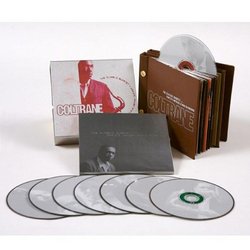 | John Coltrane COLTRANE The Classic Quartet: Complete Impulse! Studio Recordings Genres: Jazz, Pop
There have been many Coltrane compilations and box sets over the years since the saxophonist's passing in 1967, but this eight-CD complete collection of his quartet's studio recordings between 1961 and 1965 is the must-hav... more » |
Larger Image |
CD DetailsSynopsis
Amazon.com essential recording There have been many Coltrane compilations and box sets over the years since the saxophonist's passing in 1967, but this eight-CD complete collection of his quartet's studio recordings between 1961 and 1965 is the must-have. Jazz may be a music blessed with dazzling soloists, but few groups in its history seem up to perfectly matching the intentions of their leaders: Louis Armstrong's Hot Five and Hot Seven, Bill Evans's trio of 1960-61, and Miles Davis's mid-60's quintet are among the few that immediately come to mind. Coltrane's quartet of pianist McCoy Tyner, drummer Elvin Jones, and bassist Jimmy Garrison was another, a group so perfectly matched to his playing that it seems difficult to imagine him without them. Tyner, for example, immerses the group in restless chords and showers of single notes; Jones plays with stentorian power, yet tempers his playing with well-etched detail and a strong sense of melody; and Garrison anchors the quartet with drones and deeply rooted vamps. So powerful was the quartet's conception that even when ringers like Art Davis and Roy Haynes turn up on a couple of tracks, they, too, carry out Coltrane's aims, their individual differences worked into the scheme. On the 66 tracks included in this set (all now remastered) it's possible to follow the evolution of this extraordinary band from Coltrane's very ascetic approach on relatively straightforward albums such as Ballads and The John Coltrane Quartet Plays through devotional efforts like A Love Supreme and First Meditations on to Living Space and Sun Ship, those last moments before his leap of faith into the unknown in his last few years.This quartet's music is marked with a seriousness of purpose that burst the boundaries of jazz, and with a display of authority rare for any music. Yet despite its exploratory passion, it was a music grounded in the blues and the distant memory of swing. Coltrane, always the seeker, had found his kindred spirits and poured himself and all he knew into these performances; and even those who never shared an enthusiasm for his music at least always recognized this much.The final disc of the set contains seven unreleased tracks, including significantly different versions of "Bessie's Blues" and "Resolution" from A Love Supreme, and others discovered by Ravi Coltrane on his father's original reference records. (For those interested in the culture of the studio, it is fascinating to see that despite its apparent simplicity and the inevitability of its melody, a gem like "Dear Lord" began with the plague of several false starts.) Music spread across 18 albums has been collated and reassembled chronologically here, much of it not always easy to find: examples are the scattered gems "Vilia," "Dear Old Stockholm," and "Big Nick," as well as a version of "Greensleeves," originally issued as an Impulse 45 single. An essential set for understanding jazz at its highest level of achievement. --John Szwed Similar CDs
Similarly Requested CDs
|
CD ReviewsGreat Music - Acceptable Packaging Christopher Forbes | Brooklyn,, NY | 02/03/2004 (5 out of 5 stars) "The music on this 8 CD set is beyond praise, containing all of the material that Coltrane recorded in the studio for Impulse, though not anything that included any additional horns. The Dolphy cuts, which were mostly live, are not included, and neither are the albums with Ellington or Johnny Hartman. But otherwise, this is representative of Coltrane at his most influential. Included are the complete sessions that would become the albums; Coltrane, Ballads, Cresent, A Love Supreme, The John Coltrane Quartet Plays, Transition, Sunship, Infinity, and First Meditations, along with cuts from some of the other albums that are primarily live, such as Impressions or Live at Birdland. This music can arguably be considered the most important music of the last 40 years, as the Classic Quartet probably had more influence on the course of jazz and rock than any other single group in the history of American popular music. So the crux of the review here is on packaging. The CDs are presented in a bound, book-style case with an extensive liner booklet. The whole is then encased in a rather ugly metal framing. Gone are any references to the distinctive original artwork of the Impulse albums. However, the book style case does have the advantage of keeping the individual CDs together, making it harder to loose them. The cuts themselves are not presented as albums but rather in the order they originally were recorded. This has the advantage of allowing you to hear the story of the group's growth, from the first rather conservative albums Trane made to the brink of his late style on albums like Sunship. Fortunately, both the suites A Love Supreme and First Meditations were recorded in sequence and are presented as such, but to experience any of the other albums as they were first released requires extensive reprogramming. While this is not personally a big issue to me, it may be to some listeners and so I give you fair warning.The final disc in the set consists of alternative takes of many of the studio sessions. I do appreciate that fact that the producers put these alternative takes on a separate CD rather than interspersing them with the other material. These takes are interesting for documentary purposes, but there are solid reasons why they were rejected and I find that I don't listen to this disc as much as I do the others in the series.If you already have most of the Impulse albums of Trane, this is a boxed set you should pass over. There's nothing new here that you wouldn't have in some other form, and the alternate takes are certainly not worth the price. But if you only have a few of Trane's classic Impulse albums, then this is probably a good buy for you, along with the Complete Live at the Village Vanguard sessions. Between the two, you get a wonderful portrait of this seminal band. But keep in mind these two caveats; you don't get the original artwork and liner notes with this set, and you need to do extensive programming to recreate the albums as they were released (and in fact, with some of the mixed live and studio albums, you need both boxed sets to do this). I give the set five stars because of the music. I cannot in good conscience do less...but if the packaging is a big issue to you, you might take away a star and a half for that." An important compilation...but not without its problems. N. Dorward | Toronto, ON Canada | 04/01/2001 (5 out of 5 stars) "Hard to add much to the comments [...] concerning the beauties of the music contained in this set. I do feel somewhat ambivalent about this particular reissue, however; the casual listener may still find it more satisfying to possess the original albums in their current remastered CD format. This set is physically quite beautiful: a silver metal slipcover encloses a leatherbound folder that contains eight CDs in pockets and a perfectbound booklet whose primary colour is silver. But this repackaging displaces a number of important features of the original albums. The truly inexcusable thing here is the suppression of the original liner notes, in particular that to _A Love Supreme_. The notes to that album were written by Coltrane himself, fittingly for his most personal and ambitious album to date: & they included a deeply felt free-verse prayer he wrote which is given musical utterance in the final section of the piece. (Literally so: you can follow along with the text as you listen to the music, each note corresponding to a word.) & the evocative covers of the original albums are nowhere reproduced in the booklet. It's bizarre that the organizers of this boxed set had no difficulties in deleting all such historically important material from this reissue, while meanwhile completely rearranging the tracks in order of their being set down in the studio, as is the current pedantic fashion in reissues. The result of this reordering is to damage the integrity of albums (& again, it was _Coltrane_ who decided on the running order of the albums). Even the author of the liner notes to this set, Bob Blumenthal, admits that one album here, _Ballads_, is "a beautiful album-length statement" & that "Generations of listeners have enjoyed the original LP order". So why mess with it, given that rearranging the tracks provides minimal insight into the sessions? The vapidly reverent tone of Blumenthal's booklet sits ill at ease with the lack of reverence for Coltrane's intentions & even for Coltrane's words. (Hard to believe Blumenthal won an award for the liner notes, which are bland & uninformative, though they have the occasional entertaining goof, as when he speaks of "the metabolic sweep of this eloquent performance". Very disappointing, given the superb notes by David Wild to the Vanguard set.)Now, the music. The set basically splits into two phases: material from 1961-64 and a huge amount of material from 1965; the split comes almost exactly halfway through the set (on disc 3), between _A Love Supreme_ & _Plays_. The material on the first three or four discs is mostly very familiar, being some of the most famous recordings of Coltrane's career: _Ballads_, _Crescent_, _Coltrane_ & _A Love Supreme_ (plus the studio portions of _Live at Birdland_ & _Impressions_, & a few other odds & ends). Though Coltrane was as always exploring, the first few of these albums represent something of a temporary resting-point in his career: they are less exploratory than the 1961 Vanguard sessions, often keeping to a slow-to-medium groove & a lofty but impassioned tone that has finally left his furious "sheets of sound" approach way behind. _A Love Supreme_ is the turning-point, with its ambitious use of the suite form, & its programmatically wide emotional & musical range: while it has some of the wildest & fastest playing on the set up to this point, it concludes with "Psalm", a ballad which points the way to free-time exercises like "Dearly Beloved" in the future. After this point, the group changes direction, and despite Blumenthal's protestations in the liner notes it does indeed sound like the quartet becomes less & less unified as Coltrane increasingly looks for a new, freer music. There's an extraordinary amount of material from 1965 here, much of it unreleased until after Coltrane's death. Some of it is rather aimless modal exercises, some not even titled ("Untitled Original 90314" and "90320"). Sometimes Coltrane has the band essay "free" accompaniment during his solos, but Tyner reverts to conventional time playing & chords during his solos. Jones clearly isn't too comfortable playing in completely free time (see, for instance, "Sun Ship")--& indeed he never really got the hang of that style (cf. his often awkward attempt to revisit it on _Momentum Space_, a recent trio disc with Dewey Redman & Cecil Taylor). Nonetheless, there's much meat to be picked out of these sessions (which were released on albums like _Transition_, _Living Space_ & _Sun Ship_), like the fine "Vigil" (a sax-drums duo) or the gentle "Dearly Beloved", or the superb flat-out performances (with Roy Haynes subbing for Jones) on "After the Crescent" and "One Down, One Up". The best album of the 1965 discs is the unjustly little-known _First Meditations_, a quartet performance of a suite better known in the version later recorded with Pharoah Sanders & Rashied Ali added to the basic group. This version includes "Joy", which was dropped from the suite for the sextet version (& replaced with the incredibly harsh "The Father and the Son and the Holy Ghost"); it's extremely welcome to have here. Coltrane's music perhaps too rarely expressed sheer "joy": it is a music of great radiance & nobility, but its devotion to the higher spiritual plane didn't have the celebratory, joyous whoop of Ayler's rather differently devotional music, for instance (see Ayler's Greenwich Village sessions), or the purely secular joy of Ornette Coleman. _First Meditations_ is thus all the more valuable for its emotional roundedness.Lastly, I should comment on the final disc: this contains previously unreleased alternate takes & studio breakdowns. This is extremely welcome: the most valuable inclusions are fresh versions of "Crescent" & "Resolution" which are nearly as thrilling to listen to as the originals.This set is basically an important scholarly document that because of financial exigencies has been packaged like a coffee-table book. Its real importance is in putting all this stuff in one place, in particular the more obscure 1965 material, & recovering some interesting alternate takes. Nonetheless, listeners would be well-advised to consider the reissues of the original albums as the best way to listen to the more "classic" albums on this set. Those who find "later" Coltrane hard going are also warned that this set has a fair bit of such material: they will likely find little after disc 3 to their taste...though they might benefit from some openmindedness." Wonderful music but hopelessly out-of-date box set Austin Tacious | Little Buggerington | 01/10/2003 (4 out of 5 stars) "I have had this for about 3 years now and I love the music and have a love-hate relationship for the box set itself. Note the following:(1) Original artwork - missing
(2) Original liner notes - missing (3) Poem to A Love Supreme - missing (4) Order of albums released since his death (i.e. Sun Ship, Living Space) - missing (5) Title track of Kula Se Mama - missing (6) New remaster of A Love Supreme (which is incredible) - missing (7) All tracks arranged in chronological order (rather than order as per albums) except the out-takes (8) Serious examination of the contained work - missing (9) I think that now there is only 2-3 tracks that are not available on the individual remastered albums. (10) This actually does not contain all the studio recordings of the Quartet if you look at the additional tracks on remasters released in the past 3 years.Personally, I think (1)-(3) is unforgivable. If you buy this, you are still going to want to go and get the new remaster of A Love Supreme.This being said, this is a convenient way to get hold of a whole load of incredible music. It is a extremely hard-wearing box set also (unlike many). However, I think that with all the remasters around now, most of which contain material not present on this, if you can be patient, go through the albums individually. Alas, this box set is now hopelessly out-of-date." |

 Track Listings (14) - Disc #1
Track Listings (14) - Disc #1